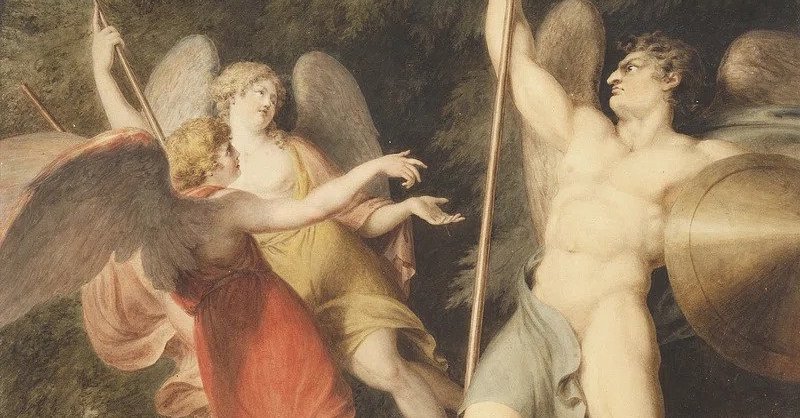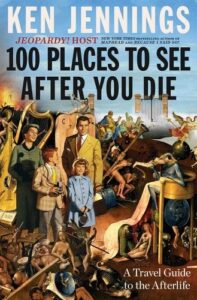
What John Milton’s Heaven Has to Offer the Soul—According to Ken Jennings
The Former Jeopardy Champion Has Some Thoughts on Literary After Death Destinations
John Milton set just as much of his 1667 epic poem Paradise Lost in heaven as he did in hell—which isn’t a theological problem, but it’s definitely a literary one. Satan is a terrible role model, but he’s a much more interesting character than God. By the same token, Milton’s “Empyreal Heaven” is a lot duller than his volcano-choked hell.
At the end of Paradise Lost, the archangel Michael promises that God will eventually blast Satan’s hell out of existence and raise up the new heaven and earth promised in the Book of Revelation. Presumably that’s where you’ll end up if you choose a Miltonian paradise. But let’s assume it will look more or less like the pregame heaven described in Paradise Lost.
If that’s true, you’ll arrive at a realm ringed by a crystal wall and enter through the blazing portal of its golden-hinged gate—which will open and close for you automatically, like at a grocery store. Pause to check out the superb views of the “clear hyaline” of the firmament and the earthly plane visible below. Then turn and follow the broad road into heaven, paved with stars and golden dust. From beneath, you once knew it in the night sky as the Milky Way.
Satan is a terrible role model, but he’s a much more interesting character than God.
Below its crystalline sky, heaven has hills, dales, rocks, waters, and woods. The grassy carpet under your feet is a green “sea of jasper” dotted with celestial purple roses. The road leads to the Holy Hill, on which sit two thrones. You can probably make out the Son sitting on His Father’s right hand, but the big man Himself will be hidden in a golden cloud— God’s glory is so bright that even the Seraphim shade their eyes with their wings. When He speaks with His voice of thunder, an ambrosial fragrance fills the Empyrean; when He’s angry, smoke and flames wreathe His throne.
As an angel, you’ll spend most of your days sitting in “fellowships of joy” around the Fount of Life and the River of Bliss, an amber stream that flows over Elysian flowers. A flower called amarant was transplanted here from Eden when Adam fell, and you’ll weave its blossoms into your golden crown. When trumpets sound, you’ll congregate at God’s throne with the Heavenly Quire. You’ll probably have a golden harp hanging at your side like a quiver of arrows; if the harp’s not your thing, you can join in with “soft tunings” of organ, pipe, or dulcimer instead.
Countless other angels accompany the hymns by dancing around the sacred hill in an intricate, mystical ballet that mirrors the harmonious motion of the heavenly spheres. At designated break times, banquets miraculously appear, the tables laden with heavenly fruit and rubied nectar in cups of gold and diamond and pearl. In the Empyreal twilight, pavilions appear on the plain where all can sleep—except God, of course, and those assigned to praise Him all night in shifts.
But that chill vibe can change in an instant if heaven needs to go to war. Then the heavenly host forms into ranks and companies: Thrones, Potentates, Dominations, Princedoms, Virtues, Powers, and so forth. Literally millions of banners circle the throne, each one inscribed with the great deeds of “zeal and love” performed by the angels who hold them. Two brass mountains nearby are where God keeps the armory of heaven—His chariots, His fiery steeds. The memory of Satan’s rebellion means this is an unusually militarized paradise. You’re in the army now.
__________________________________

Excerpted from 100 Places to See After You Die: A Travel Guide to the Afterlife by Ken Jennings. Copyright © 2023. Reprinted with permission of Scribner, a division of Simon and Schuster, Inc.
Ken Jennings
Ken Jennings was an anonymous Salt Lake City software engineer in 2004 when he unexpectedly became a TV celebrity after his record-breaking seventy-four-game, $2.5 million winning streak on the syndicated quiz show Jeopardy! Today, he is the author of thirteen books, including the New York Times bestsellers Brainiac, Maphead, and Because I Said So!, as well as the Junior Genius Guides for children. In 2020, he was named Jeopardy!’s “Greatest of All Time” after winning a primetime tournament on ABC, and in 2022, succeeded Alex Trebek as a permanent host of the show. He grew up in Seoul, South Korea, but for the last fifteen years has lived in his native Seattle with his family and dogs.



















